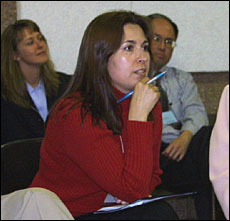



 | |
   |

|
What is a Deliberative Opinion Poll®? How
Does a Deliberative Opinion Poll® Work? Deliberative
Poll® Results Show Citizens' Healthcare, Education Concerns In fall 2005, By the People sponsored scientific experiments to see what the public would think about education and healthcare, if people became more informed about the issues and talked about them together, both online and face-to-face. Results from this Deliberative Polling® were revealed on By the People, a national PBS special that aired on November 10, 2005. Quicktime Video: View highlights from the broadcast (6Mb) Approximately 1,000 Americans engaged in an online Deliberative Poll®. For five weeks, participants joined in weekly small group dialogues with trained moderators, discussed balanced briefing materials and posed questions to experts from different points of view. Citizens also participated Deliberative Polling® in conjunction with face-to-face Deliberation Week conversations, hosted by PBS stations and civic partners. Participants in By the People's online Deliberative Poll® thought that the number of Americans without health insurance was the single most important problem facing the system, and they were willing to support policies that would require at least some sacrifices on their part to deal with it. On education, participants moved toward local control and parental involvement as key factors in improving the nation's schools. You may read more about the online poll results by visiting our Online Deliberation page. Deliberation Week events took place in Albuquerque, NM; Baton Rouge and Hammond, LA; Bowling Green, OH; Charlottesville, VA; Cleveland, OH; Detroit, MI; Kansas City, MO; Kearney, NE; Miami, FL; Muncie, IN; New Haven, CT; Pittsburgh, PA; Rochester, NY; St. Louis, MO; San Diego, CA; and Seattle, WA. Answers to the national survey questions revealed some interesting differences among the cities participating in face-to-face citizen dialogues during Deliberation Week, as well as between locals and the national online participants. These differences suggest the distinctiveness of local challenges and perceptions. On the topic of healthcare, local communities, like the national online participants, thought that the cost of healthcare and the lack of insurance coverage were the two most important questions, but most of them ranked cost above the problem of insurance, while the online participants thought the opposite. When asked to what extent their own Congressional representatives and state legislators reflected their priorities, local participants were, for the most part, more out of synch with the national than with the state officials. On education, both the online and face-to-face dialogue participants graded the nation's schools lower than the schools in their own communities. Participants in the local sites varied considerably on whether the state or the locality should control testing. On this issue, the rural community of Kearney, NE, whose participants were approximately half randomly-invited educators, strongly favored local control. On "No Child Left Behind," in general local sites were more favorable than the national online deliberators, with the marked exception of Kearney. You may read more about the local education and healthcare Deliberative Polling® results-- as well as how participant samples were selected-- here in .pdf form. About
the Deliberative Polls® | |||||||||||||||